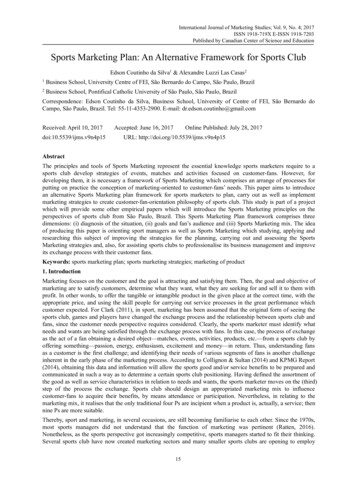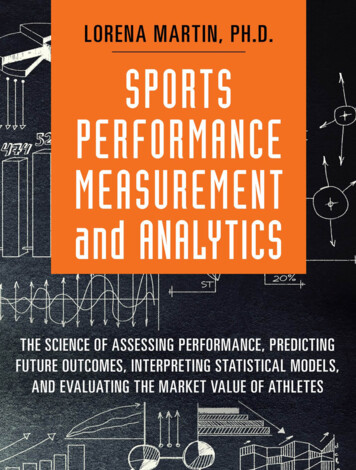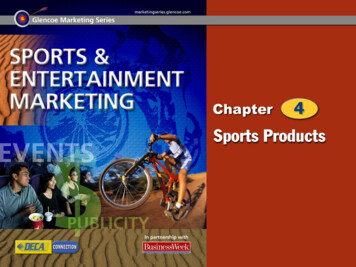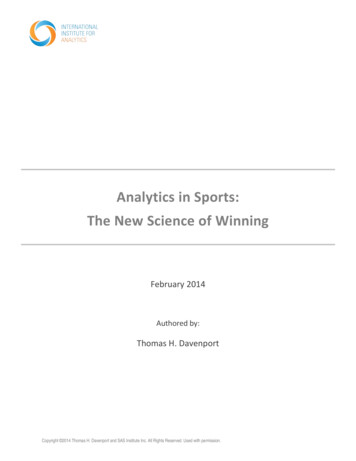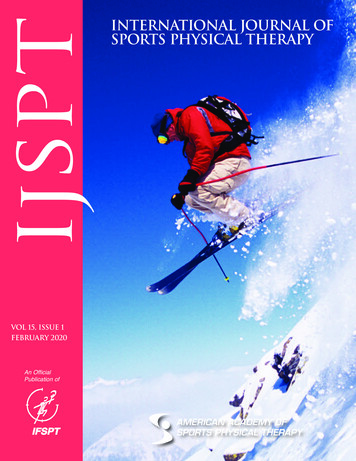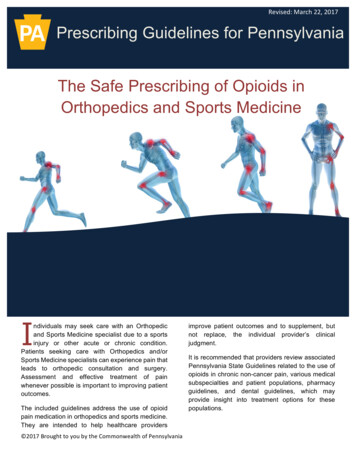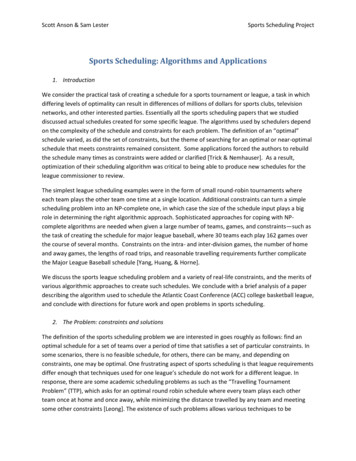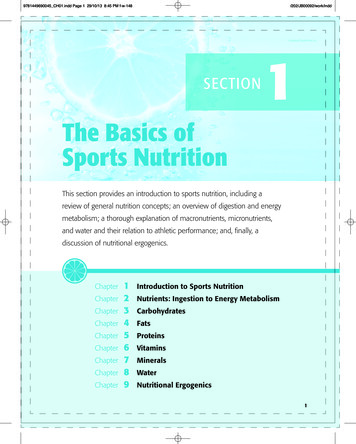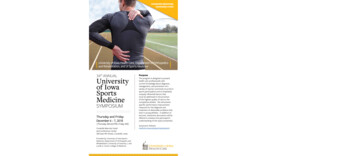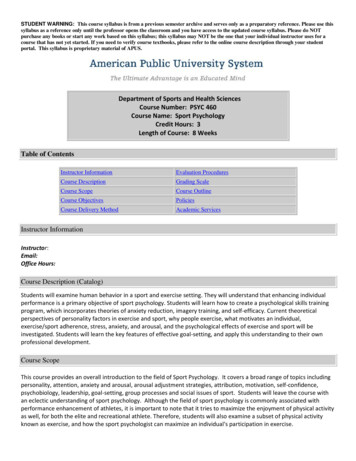
Transcription
STUDENT WARNING: This course syllabus is from a previous semester archive and serves only as a preparatory reference. Please use thissyllabus as a reference only until the professor opens the classroom and you have access to the updated course syllabus. Please do NOTpurchase any books or start any work based on this syllabus; this syllabus may NOT be the one that your individual instructor uses for acourse that has not yet started. If you need to verify course textbooks, please refer to the online course description through your studentportal. This syllabus is proprietary material of APUS.Department of Sports and Health SciencesCourse Number: PSYC 460Course Name: Sport PsychologyCredit Hours: 3Length of Course: 8 WeeksTable of ContentsInstructor InformationEvaluation ProceduresCourse DescriptionGrading ScaleCourse ScopeCourse OutlineCourse ObjectivesPoliciesCourse Delivery MethodAcademic ServicesInstructor InformationInstructor:Email:Office Hours:Course Description (Catalog)Students will examine human behavior in a sport and exercise setting. They will understand that enhancing individualperformance is a primary objective of sport psychology. Students will learn how to create a psychological skills trainingprogram, which incorporates theories of anxiety reduction, imagery training, and self-efficacy. Current theoreticalperspectives of personality factors in exercise and sport, why people exercise, what motivates an individual,exercise/sport adherence, stress, anxiety, and arousal, and the psychological effects of exercise and sport will beinvestigated. Students will learn the key features of effective goal-setting, and apply this understanding to their ownprofessional development.Course ScopeThis course provides an overall introduction to the field of Sport Psychology. It covers a broad range of topics includingpersonality, attention, anxiety and arousal, arousal adjustment strategies, attribution, motivation, self-confidence,psychobiology, leadership, goal-setting, group processes and social issues of sport. Students will leave the course withan eclectic understanding of sport psychology. Although the field of sport psychology is commonly associated withperformance enhancement of athletes, it is important to note that it tries to maximize the enjoyment of physical activityas well, for both the elite and recreational athlete. Therefore, students will also examine a subset of physical activityknown as exercise, and how the sport psychologist can maximize an individual's participation in exercise.
STUDENT WARNING: This course syllabus is from a previous semester archive and serves only as a preparatory reference. Please use thissyllabus as a reference only until the professor opens the classroom and you have access to the updated course syllabus. Please do NOTpurchase any books or start any work based on this syllabus; this syllabus may NOT be the one that your individual instructor uses for acourse that has not yet started. If you need to verify course textbooks, please refer to the online course description through your studentportal. This syllabus is proprietary material of APUS.Course ObjectivesUpon completion of this course of study, the student will be able to:-Analyze how a person’s psychological makeup influences an individual’sbehavior in physical activity contexts?Describe typical views of motivation and apply the fundamentals of achievement motivation to guide practice andperformance.Identify the major sources of anxiety and stress, and explain how and why arousal and anxiety-related emotionsaffect performance.Understand how groups are structured, and explain how to create an effective team climate.Define the principles of psychological training and develop a psychological skills training program.Describe effective goal-setting principles and design a comprehensive goal-setting program.Explain the effects of exercise on anxiety and depression, and discuss the relationship between exercise andpsychological well-being.Define and discuss addictive and unhealthy behaviors, and create prevention and detection strategiesCourse Delivery MethodThis PSYC 460 Sport Psychology course delivered via distance learning will enable students to complete academic workin a flexible manner, completely online. Course materials and access to an online learning management system will bemade available to each student. Online assignments are due by Sunday evening of the week as noted. Your first Forumpost is due Thursday evening, except for the first week where all assignments are due on Sunday. Follow-up Forumposts are due Sunday evening.Course MaterialsRequired Course Textbook:Book NumberSPMT 460-0AuthorsWeinberg & GouldBook TitleFoundations of sport andexercise psychology, 5thed.Publication InfoChampaign: HumanKineticsISBN10-0-73608323-5Textbook in APA format:Weinberg, R., and Gould, D. (2007). Foundations of sport and exercise psychology, 5th ed. Champaign, IL:Human Kinetics.Required Readings:See Course OutlineAdditional Resources:In the Lessons Link there are additional course articles, and up to date APA handouts.
STUDENT WARNING: This course syllabus is from a previous semester archive and serves only as a preparatory reference. Please use thissyllabus as a reference only until the professor opens the classroom and you have access to the updated course syllabus. Please do NOTpurchase any books or start any work based on this syllabus; this syllabus may NOT be the one that your individual instructor uses for acourse that has not yet started. If you need to verify course textbooks, please refer to the online course description through your studentportal. This syllabus is proprietary material of APUS.WebsitesIn addition to the required course texts the following public domain Websites are useful. Please abide by the university’sacademic honesty policy when using Internet sources as well. Note web site addresses are subject to change.Site NameThe OWL at PurdueAPA Style HomepageNorth American Society of Sports ManagementWebsite uation ProceduresEvaluation ProceduresGraded AssignmentWeek 1Percentof Final GradeIntroductory & Personality Forum3Quiz5Week 2 Forum Achievement Motivation3Understanding Attributions4APA Quiz Due2Quiz5Week 3 State Anxiety InstrumentQuiz45Week 4 Forum Developing Group/Team Identity3Topic Proposal for issues Analysis Paper6Quiz5Week 5 Forum Psychological Skills Training3Psychological Skills Training Inventory4Quiz5Week 6 Forum Goal-Setting3Goal Sheet4Quiz5Week 7 Forum Exercise and Psychological Well-Being3Quiz5Issues Analysis paper15Week 8 Forum Behaviors in Youth Sport3Quiz5
STUDENT WARNING: This course syllabus is from a previous semester archive and serves only as a preparatory reference. Please use thissyllabus as a reference only until the professor opens the classroom and you have access to the updated course syllabus. Please do NOTpurchase any books or start any work based on this syllabus; this syllabus may NOT be the one that your individual instructor uses for acourse that has not yet started. If you need to verify course textbooks, please refer to the online course description through your studentportal. This syllabus is proprietary material of APUS.--------------Total100For a description of specific evaluation requirements for each assignment and forum, please review the rubric ineach assignment area. In addition, a forum rubric example is available in you Resource section.Course Outline8 Week CourseWeek1Topic(s)Introductionpersonalityfactors thatimpact uponperformancein sportsettings.LearningObjective(s)1,Reading(s)Ch. 1 & 2PowerPointLecture /www.naspspa.org/Assignment(s)Forum: Introduction &PersonalityQuizAPA QuizAPA guideline informationCh. 3 & 62Lecture nsForum: Achievement MotivationMotivation Problem SolvingWork ation-inAPA watch?v I1K6bOG8mj8QuizAPA guideline information3Arousal, StressCh. 4SCAT Anxiety Test/Assignment
STUDENT WARNING: This course syllabus is from a previous semester archive and serves only as a preparatory reference. Please use thissyllabus as a reference only until the professor opens the classroom and you have access to the updated course syllabus. Please do NOTpurchase any books or start any work based on this syllabus; this syllabus may NOT be the one that your individual instructor uses for acourse that has not yet started. If you need to verify course textbooks, please refer to the online course description through your studentportal. This syllabus is proprietary material of APUS.and Anxietyand SportEnvironments3Lecture uk/companx.htm4EffectiveGroup/teamClimateCh. 7-10Lecture NotesPowerPointAnalysis Paper 3-collegesports-team-building-issuesCh. 11-14Lecture NotesPowerPoint5PsychologicalSkills Training67Exercise andPsychologicalWell-Being8Youth Sportand AddictiveBehaviorsQuizForum: Psychological SkillsTraining (PST)5websitePsychological Skills /www.bodybuilding.com/fun/psychological- Quizskills-training.htmCh. 15 & 16Lecture NotesPowerPointtheimportance ofgoal settingForum: Developing Group TeamIdentity67Website:My Goals Sheethttp://www.youtube.com/watch?v mqxbjXzvzFwhttp://www.youtube.com/watch?v i0mSyQLnzNQ Quiz&playnext 1&list PL97899E8D0916B674&index 29Chapter 17-21Lecture NotesPowerPointForum: Psychological Well-beingJustifying Exercise andPsychological rticle.aspx?atid 111 Issues/Analysis paperChapter 22-24Lecture Notes8Forum: Goal-setting Case StudyForum: Behaviors in Youth SportSubmitting IssuesQuiz
STUDENT WARNING: This course syllabus is from a previous semester archive and serves only as a preparatory reference. Please use thissyllabus as a reference only until the professor opens the classroom and you have access to the updated course syllabus. Please do NOTpurchase any books or start any work based on this syllabus; this syllabus may NOT be the one that your individual instructor uses for acourse that has not yet started. If you need to verify course textbooks, please refer to the online course description through your studentportal. This syllabus is proprietary material of APUS.Please see the Student Handbook to reference the University’s grading scaleLibrary GuideRequest a Library Guide for your course (http://apus.libguides.com/index.php)The AMU/APU Library Guides provide access to collections of trusted sites on the Open Web andlicensed resources on the Deep Web. These are specially tailored for academic research at APUS: Program Portals contain topical and methodological resources to help launch general research in thedegree program. To locate, search by department name or navigate by school.Course Lib-Guides narrow the focus to relevant resources for the corresponding course. To locate,search by class code (e.g., SOCI111) or class name.If a guide you need isn't available yet, let us know by emailing the APUS Library: librarian@apus.edu
Foundations of sport and exercise psychology, 5th ed. Champaign: Human Kinetics 10-0-7360-8323-5 Textbook in APA format: Weinberg, R., and Gould, D. (2007). Foundations of sport and exercise psychology, 5th ed. Champaign, IL: Human Kinetics. Re
